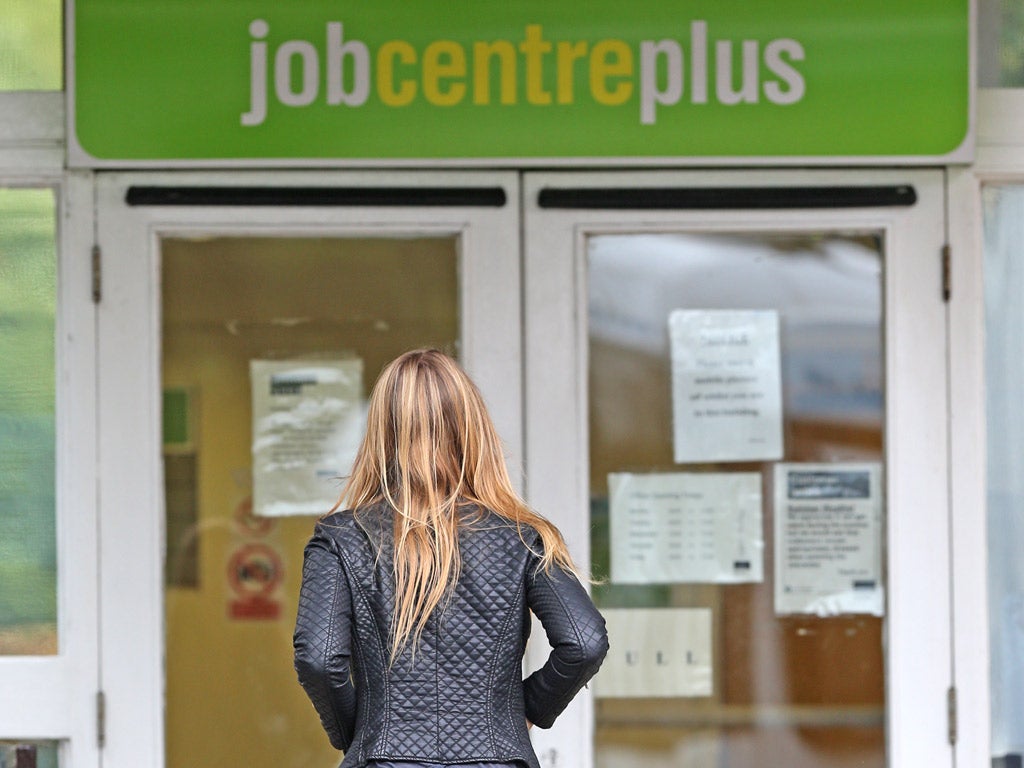Nearly a million under-25s still unemployed despite growth
IPPR says unemployment rate among 25 to 64 year-olds fell 0.2 per cent to 5.6 per cent in past year, while rate rose by 0.5 per cent to 21 per cent for younger jobseekers

Your support helps us to tell the story
From reproductive rights to climate change to Big Tech, The Independent is on the ground when the story is developing. Whether it's investigating the financials of Elon Musk's pro-Trump PAC or producing our latest documentary, 'The A Word', which shines a light on the American women fighting for reproductive rights, we know how important it is to parse out the facts from the messaging.
At such a critical moment in US history, we need reporters on the ground. Your donation allows us to keep sending journalists to speak to both sides of the story.
The Independent is trusted by Americans across the entire political spectrum. And unlike many other quality news outlets, we choose not to lock Americans out of our reporting and analysis with paywalls. We believe quality journalism should be available to everyone, paid for by those who can afford it.
Your support makes all the difference.Young people in Britain are experiencing a “jobless recovery” as unemployment among them rises while older people find work, according to a study published today.
The Institute for Public Policy Research (IPPR) think-tank found that the traditional link between youth unemployment and economic growth has been broken.
The jobless rate among under-25s is now 3.74 times the adult rate, up from 3.5 times the adult rate a year ago.
More than 950,000 young people are now unemployed and almost a third (30 per cent) of them have been looking for work for more than a year. The latest official monthly statistics will be published today.
The IPPR said the unemployment rate among 25 to 64 year-olds fell by 0.2 per cent to 5.6 per cent in the past year, while the youth unemployment rate rose by 0.5 per cent to 21 per cent.
Similarly, the employment rate among 25 to 64 year-olds increased by 0.4 per cent to 71.7 per cent, but for young people it dropped by 1.1 per cent to 49.9 per cent.
The IPPR found the same trend across Europe but some important differences between countries. Although young people in the UK find a first job more quickly than in any other European Union country, their transition to work is more risky.
The jobless rate among under-25s who have left education is 20 per cent in Britain, much higher than the Netherlands, Germany, Denmark and Belgium.
According to the study, youth unemployment in the UK has increased steadily relative to adult unemployment since well before the recent recession. It grew from one-and-a-half times the adult rate in 1989, to more than three-and-a-half times the adult rate in 2005.
Spencer Thompson, a research fellow at IPPR, said: “In the UK, and across Europe, the labour market position of young people started to deteriorate many years before the financial crisis and subsequent recession. A return to economic growth will not, on its own, bring about a sustained fall in youth unemployment.”
He added: “The relationship between youth unemployment and GDP growth was already weak and has become weaker since the recession. The position in the UK is particularly bad for young people. Countries that experienced a similar fall in GDP to that seen in the UK saw a less severe increase in youth unemployment.”
Mr Thompson warned that “tinkering” with “crisis-response policies” like the Government’s Work Programme and Youth Contract or reforming the education system would not be enough.
“We need to create much stronger links between education policy and labour market policy, particularly for those that do not go from school or college into university education,” he said.
“This requires an all-encompassing system that provides pathways from school through to employment and stops young people from dropping out of the system. We need guarantees of quality vocational education and real work experience that prevent young people becoming inactive.”
He said Britain should follow the lead of countries such as Denmark and the Netherlands, who have created “earn or learn” plans for 18 to 45-year-olds and taken them out of their mainstream welfare systems.
David Cameron hinted at a “tough love” approach towards Neets – young people not in education, employment or training – in his speech to the Conservative Party conference last month. But his plans to withdraw housing benefit and jobseeker’s allowance from some under-25s faces opposition from the Liberal Democrats.
Join our commenting forum
Join thought-provoking conversations, follow other Independent readers and see their replies
Comments